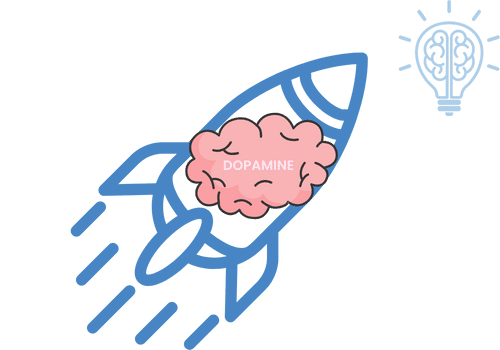What Is a Dopamine Boost?
A dopamine boost is a surge of the neurotransmitter dopamine, which plays a key role in motivation, reward, and focus. Dopamine is often referred to as the “feel-good” chemical because it reinforces behaviors that bring pleasure, achievement, or excitement.
While dopamine is essential for motivation and goal-directed behavior, excessive or poorly managed dopamine boosts can lead to distraction, procrastination, and addictive behaviors—especially when it comes from instant gratification activities like social media, video games, or junk food.
Why Dopamine Matters
Dopamine is responsible for driving us to pursue goals, complete tasks, and seek rewards. A well-balanced dopamine system can improve:
- ✅ Motivation – Helps initiate and sustain effort toward goals.
- ✅ Focus – Increases concentration and task persistence.
- ✅ Learning – Enhances memory and skill acquisition.
- ✅ Productivity – Reinforces completing tasks by creating a sense of reward.
How Dopamine Boosts Occur
There are two main ways a dopamine boost can be triggered:
🚀 1. Natural Dopamine Boosts (Healthy & Productive)
These occur when we complete meaningful tasks, engage in physical activity, or work toward long-term goals.
- 🏃 Exercise – Running, strength training, and movement increase dopamine levels.
- 🎯 Goal Achievement – Completing tasks and small wins provide natural reinforcement.
- 🧠 Deep Work & Learning – Engaging in challenging but rewarding tasks triggers dopamine.
- 🌞 Sunlight & Nutrition – Healthy habits like getting sunlight and proper nutrition support dopamine production.
⚠️ 2. Instant Dopamine Boosts (Disruptive & Addictive)
These come from quick, low-effort rewards that feel good but don’t contribute to long-term success.
- 📱 Social Media Scrolling – Likes, comments, and notifications trigger short-term dopamine spikes.
- 🍕 Junk Food & Sugar – Processed foods give quick pleasure but lead to energy crashes.
- 🎮 Video Games & Binge-Watching – Engaging content creates easy dopamine without effort.
- 🛍️ Online Shopping – The anticipation of a purchase triggers a dopamine surge.
How Dopamine Affects Executive Function
Dopamine plays a major role in executive function skills, influencing motivation, focus, and self-regulation.
- Task Initiation: Dopamine helps drive action and prevents procrastination.
- Goal-Directed Persistence: Supports staying on track and resisting distractions.
- Inhibitory Control: Low dopamine regulation can lead to instant gratification behaviors.
- Working Memory: Supports retention of relevant information for problem-solving.
- Attention Regulation: Helps sustain focus on important tasks rather than distractions.
Common Challenges with Dopamine Regulation
While dopamine is essential for motivation, an imbalance can lead to distracted attention and difficulty staying on task.
⚠️ 1. Dopamine Overload (Too Much Stimulation)
Excessive social media, video games, or sugar can create an over-reliance on instant gratification, making it harder to focus on less stimulating but important tasks.
⚠️ 2. Low Dopamine (Lack of Motivation)
When dopamine levels are too low, tasks feel overwhelming, leading to procrastination, burnout, or executive dysfunction.
⚠️ 3. The Dopamine Addiction Cycle
Seeking frequent, easy dopamine boosts (e.g., phone notifications) reduces the brain’s sensitivity to natural rewards, making long-term goals less appealing.
How to Boost Dopamine Naturally for Productivity
To improve focus and motivation, balance dopamine levels with healthy, sustainable habits.
✅ 1. Break Tasks into Small Wins
Completing small, achievable goals creates continuous dopamine reinforcement for sustained motivation.
✅ 2. Use the 10-Minute Rule
If you’re struggling to start a task, commit to just 10 minutes. Often, the initial action provides enough dopamine to continue.
✅ 3. Delay Instant Gratification
Before checking social media or indulging in a quick reward, complete a meaningful task first.
✅ 4. Engage in Physical Activity
Exercise is one of the most effective ways to trigger natural dopamine production and increase energy.
✅ 5. Limit Dopamine Distractions
Reduce phone notifications, background entertainment, and frequent multitasking to prevent overstimulation.
✅ 6. Pair Boring Tasks with Enjoyable Elements
Listen to music, use a timer, or reward yourself after completing a task to make work more engaging and rewarding.
How Executive Function Coaching Can Help
If you struggle with motivation, focus, or impulse control, executive function coaching can help you balance dopamine use and develop strategies to stay on track.
Coaching can help with:
- Identifying distractions and limiting instant gratification habits.
- Creating dopamine-friendly routines for focus and productivity.
- Strengthening goal-directed persistence to improve motivation.
- Using behavioral reinforcement to build long-term success habits.
By understanding dopamine’s role in motivation, individuals can create a balanced approach to work, focus, and daily habits.
📞 Want to improve focus and motivation? Contact us for executive function coaching today!




